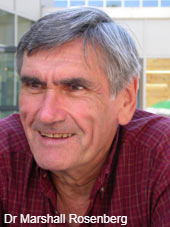Nonviolent Communication was developed by Dr Marshall Rosenberg when he became disillusioned with the way he was expected to work with patients as a newly qualified psychologist. He wanted something more in tune with honouring people and their humanity.
 Marshall (photo right) developed a system to help people in a positive way and this has turned into a world-wide movement involving ordinary people, mediators, parents, therapists, educators and peace-activists. He hopes these initiatives will continue to spread and lay the foundations for a more compassionate society.
Marshall (photo right) developed a system to help people in a positive way and this has turned into a world-wide movement involving ordinary people, mediators, parents, therapists, educators and peace-activists. He hopes these initiatives will continue to spread and lay the foundations for a more compassionate society.
Essentially, nonviolent communication involves changes in the way we habitually encounter one another. While we talk and try to relate, we hold in our hearts the belief that we share universal human needs (to be autonomous, accepted, supported, safe, creative, rested, joyful, etc., etc.). Marshall sees this as a practical spirituality, a choice to treat one another how we want to be treated and to use language to reveal our own and the other person’s humanity.
The name Nonviolent Communication shows that Marshall was aware that people found the judgments and demands inherent in usual communication styles less than compassionate and indeed sometimes outright violent. This led to a culture of distance and division; life was less peaceful than he thought our underlying common humanity called for. He set about devising a language that was more compassionate, life-affirming and effective.
Needs are met through Effective Communication
In nonviolent communication, we use language, not to turn away, admonish or seek to control but to express our felt needs and to respectfully ascertain what feelings and needs are alive in the other person. The aim is to use empathy and self-empathy to prevent misunderstandings and the closing of hearts. It is a way to maximize our chances of relating well. To non-violent communicators this means helping to meet the other person’s genuine needs whilst also getting our own human needs met.
People who feel they are being respected through being heard compassionately are less likely to respond to us through fear and disappointment with anger and denial. They tend not to attack with harsh judgments, are less inclined to deny our perspectives, ignore our feelings and deny our needs. Humans tend to act reciprocally; happy people are more generous.
Learning nonviolent communication helps you to become more literate in the ways of the human heart. Not only do you learn to keep your humanity in difficult interpersonal situations, you learn to name your feelings and listen to your own real needs. Keeping comments to observations rather than judgments helps you to stop taking things personally and making assumptions about others motivations and intentions. You are rewarded with less stress, less unhappiness. Relating well oils the wheels of living with others, be they your loved ones, your employees, your pupils, your neighbours.
Violence in any form is a tragic expression of our unmet needs.
– Marshall B. Rosenberg, PhD.
Anger, relationship and self esteem problems respond very well to nonviolent communication but it is efficacious whenever anyone desires a richer, less problem-filled life. Therapy may concentrate on discovering how neglected or misconstrued needs may be playing havoc in your life. The focus is then on learning the skills required to join with others to really communicate and seek out a solution which meets everyone’s human requirements.
Without nonviolent communication, the ways in which we try to meet our needs often fail because our strategies cut across the needs of other people, or we are not able to express our real concerns. With non-violent communication the energy that has been used to defend a position can be freed for a deeper, more effective discussion. Learning to express your feelings in terms of your own observations, needs and wishes helps to avoid blaming and demanding.
I encourage you to discover more about this peace-making, satisfaction-building field.
Article posted 20 November 2012

Alison Edwards
Alison is a counsellor, clinical supervisor, and communications coach in private practice in Auckland


